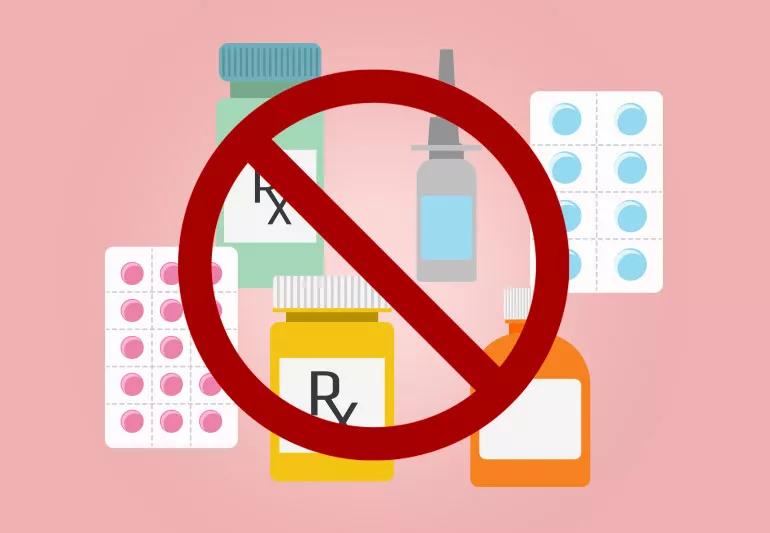Major recalls are rare — but you’ll definitely hear about them

Image content: This image is available to view online.
View image online (https://assets.clevelandclinic.org/transform/2ab21644-11ce-4610-8401-ccfac3a1b4c7/medsRecalled2-508497310-770x553_jpg)
Various medications with a warning symbol over them
You’re listening to the news, enjoying your morning cup of coffee, when you hear the words “FDA recall” followed by the name of the medication you’re about to pop into your mouth.
Advertisement
Cleveland Clinic is a non-profit academic medical center. Advertising on our site helps support our mission. We do not endorse non-Cleveland Clinic products or services. Policy
Well, that’s unsettling. What should you do now? The answer may surprise you.
“It may be more harmful to stop taking the medication,” says registered pharmacist Chris Snyder. “Take the medication as prescribed and contact your doctor or pharmacist as soon as possible.”
There are a few other things you should know about U.S. Food & Drug Administration recalls involving drugs, according to Snyder.
Many recalls are minor. They may involve a slight wording change to a label or patient information leaflet, for example, and never make the news.
Others, like the November 2018 recall of generic blood pressure medications, get media attention because they may pose a serious health hazard to people taking them. (In this case, an impurity found in the blood pressure medication was classified as a probable human carcinogen.)
Generic drugs are recalled more often, overall. But that’s because there are so many more generics on the market — not because they’re less safe, Snyder says.
The FDA also regulates medical devices. Another recent recall you might have heard about involved potential problems with pacemakers and other electrical device implants.
“We get alerts from the FDA almost daily,” Snyder says. “The majority aren’t impactful. The big ones are rare.”
Advertisement
Sometimes consumers receive a letter from the drug manufacturer or the prescribing physician’s health care system. Or, you may hear about a recall during a visit to your local pharmacy.
“To be an educated consumer, you can also look at the FDA Drug Recall listing,” Snyder says.
A company may conduct a drug recall on its own initiative or by FDA request, but the FDA lists all drug recalls as voluntary.
Drug companies have a high incentive to recall a drug that has a potential risk to consumers, in order to avoid litigation and financial liability, Snyder explains.
The FDA’s role in a recall is to oversee a company’s strategy, assess the adequacy of the recall and classify the recall according to its health risk.
Sure, you should take a recall notification on your medication seriously, but don’t overreact, Snyder says.
Continue to take the drug as your doctor prescribes until you are able to contact your pharmacist or physician for advice. He advises reaching out to them as soon as possible.
They may suggest an alternative drug, or tell you to continue with your current medication. Or, they may advise you to return the medicine to the pharmacy.
And, remember, the majority of drug recalls are minor.
“The FDA is involved in the manufacturing of drugs every step of the way,” Mr. Snyder says. “The agency has strict guidelines and tight specifications. They want it to be as perfect as they can get it.”
Advertisement

Sign up for our Health Essentials emails for expert guidance on nutrition, fitness, sleep, skin care and more.
Learn more about our editorial process.
Advertisement
The little blue pill might help with physical arousal, but there are better treatments for low libido in women
Your body’s response to rapid weight loss from the medication may cause shedding
This medication is best used on a limited basis
Authorized take-back programs, services and drop-off locations are the best, safest way to get rid of expired medicine
These illegal supplements have negative impacts for vital organs and may cause psychosis, heart attacks and more
These creams that you apply to your skin can actually help reduce localized pain, swelling and inflammation
Popular among teens, these inhalants give you a quick high, with serious harmful effects
‘Black box warnings’ on medications outline potential risks and important instructions
Prioritize your health by managing stress, strengthening your social connections and getting quality sleep
Bolsters, blankets, pillows and blocks can offer extra support, stability and comfort
Allergies, postnasal drip, asthma or reflux could be to blame for a cough that won’t quit